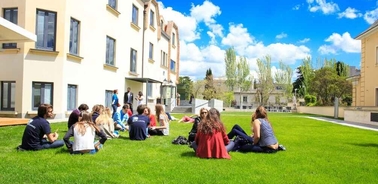- Home
- News And Events
- News
- Isabela Del Alcázar Highlights Ie University’s Sustainability Strategy At The Unwto Tourism Futures Event
Isabela del Alcázar highlights IE University’s sustainability strategy at the UNWTO Tourism Futures event

IE University’s objective is to reduce greenhouse gas emissions to zero by 2030. To reach this objective, IE University will reduce the use of plastic, single-use water bottles, paper and energy on campus.
Isabela del Alcázar, Global Head of Sustainability of IE University, recently presented the institution’s sustainability strategy with experts and speakers at the World Tourism Organization (UNWTO) event, which focused on ‘Tourism Futures in the 2030 Agenda: Innovation and Sustainability as the New Normal’. The panel is part of the High-level Political Forum on Sustainable Development (HLPF) 2020 under the auspices of the United Nations Economic and Social Council (ECOSOC). During the session, attendees focused on tourism’s cross-cutting contribution to sustainable development and the leading role of innovation, digital transformation, and green investment in tourism’s post-COVID recovery.
Isabela del Alcázar announced the plan of the institution to reduce gas emissions to zero by 2030 and the ‘10 Year Challenge’ campaign which will focus on specific annual projects from 2020 to 2030. Del Alcázar explained that this year is focused on responsible consumption.
“We believe that only through education can all of the 17 SDGs be achieved.”
Isabela del Alcázar, Global Head of Sustainability of IE University
“We need to understand the complexity and interdisciplinarity of the concepts presented in the 2030 agenda: everything is connected, nothing lives in isolation and we need a deep analysis of the different stakeholders and how they relate to one another. There needs to be a behavioral change in our society, as a University we need to lead with example,” Isabela del Alcázar added.
Alzbeta Klein, Director and Global Head of Climate Business at the International Finance Corporation (IFC), moderated a panel with experts from different sectors who shared their experiences and the actions undertaken within their firms to accelerate theachievement of sustainability and the 2030 Agenda. Key aspects to create a strong innovation ecosystem to promote the Sustainable Development Goals (SDGs), the main benefits of investing for sustainability, their perspective on the promotion of sustainable investments and how tourism can support this new model of investments.
The World Toursim Organization (UNWTO) announced the launch of the SDGs Global Startup Competition. Organized in partnership with Wakalua, the innovation hub of leading tourism group Globalia, the competition has strong private sector backing, with IE University, Amadeus, Amazon Web Services, ClarkeModet, Google, Mastercard, Plug and Play and Telefónica confirmed as lead promoters of innovation.
IE University’s objective is to reduce greenhouse gas emissions to zero by 2030. To reach this objective, IE University will reduce the use of plastic, single-use water bottles, paper and energy on campus. The institution will increase the use of recycled plastic or compostable; it will work to build awareness about recycling and implement new methods of transport for staff, faculty, and students between campus buildings.
In addition, IE University and the IE Foundation continue to work to ensure that talented students have access to the best educational opportunities and can reach their potential free of economic barriers with undergraduate and postgraduate scholarship programs. In regards to teaching and research, IE University faculty currently dedicates 1,800 hours per year to training undergraduate and graduate students in areas related to sustainability. The institution plans to double this number by 2030.